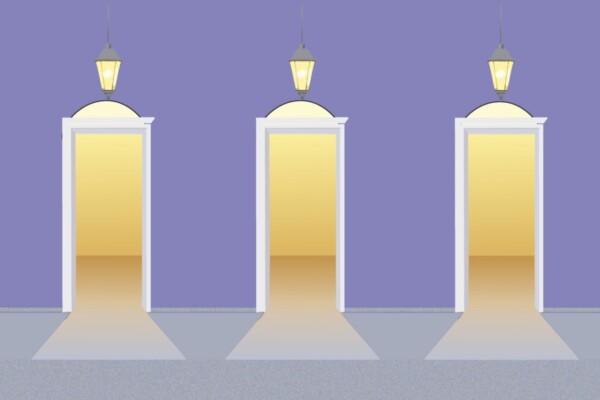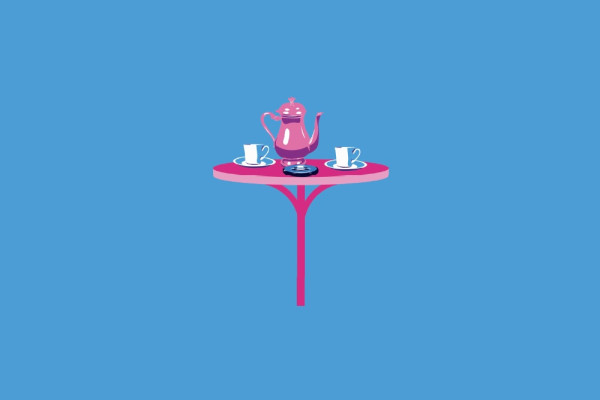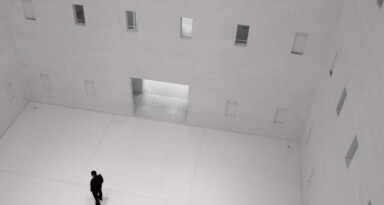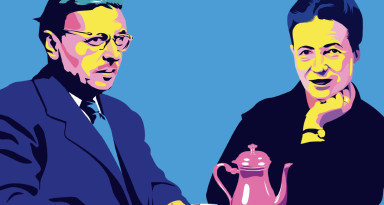There is a famous paradox, the paradox of Buridan’s Ass, named after the 14th century French philosopher Jean Buridan. Imagine an ass which is extremely hungry. It is exactly equidistant from two bales of hay (in some versions it’s a bale of hay and a pail of water and the ass is equally hungry and thirsty). On some views of what motivates action there would be nothing to make that animal head one way or the other, it would be caught in a deadlock, and so it would stay where it was and would just waste away until it died, starved by its indecision even though there was food within easy reach. Without there being anything in favour of one option over the other, deciding which way to go would be impossible. Yet who thinks that’s what the animal would actually do? Surely it would just choose one bale at random, it wouldn’t matter which one, and head for that. A human being would be even less likely to starve. If it doesn’t make any difference which choice I make, I can decide to go for the one on the left or the one on the right on a whim.
Determinists about free will would have a hard time explaining how I could make that kind of choice. And that is essentially what the paradox was meant to demonstrate. If you believe in determinism and there really is precisely as much motivation to head in either direction, I’d be frozen in between the two, incapable of any action. Determinists don’t believe we really make choices for ourselves, even when we seem to, so this wouldn’t exactly be an impossible choice, but it would be an impossible situation.
But even at a less philosophically informed level, when there really is nothing to choose between two or more options, it can take a long time to decide which of the two or more options to select. In a supermarket when there are three different types of coffee available, all about the same price, all looking to be of very similar quality, then it’s easy to waste a lot of time trying to decide which one to buy. In the 1960s, the philosopher Herbert Marcuse pointed out that many of the apparent freedoms of the west are illusory because they are of this superficial consumerist kind.
Most significant choices between two courses of action that we encounter in life, however, are not much like selecting which brand of coffee to buy. There is a fork in the road and we have to take one or other of the routes ahead, usually with incomplete information about likely outcomes. Sometimes neither path is attractive, but we rank them and go for the one that’s likely to turn out best. We usually, and quite quickly, find more to be said in favour of one than the other. And if there really is no difference, we might in the end toss a coin to decide which way to go, leaving the choice to chance.
Yet there can be choices which leave no reasonable way out and which can’t be avoided. In William Styron’s novel and the film based on it, Sophie’s Choice, Sophie arrives in Auschwitz with her two young children. She declines the advances of a Nazi officer, and perhaps in revenge and to show his power over her, he tells her that only one of her two children can be saved, and she has to choose which one. Sophie pleads, “Don’t make me choose. I can’t choose.” His response is to order a junior Nazi to take both children away. Rather than that, she tells him in desperation, “Take my little girl!” Her young daughter is dragged away screaming and presumably dies in the gas chambers; the boy is sent to the children’s section of the camp, with a chance of survival.
She has been forced to make an impossible choice. She could have chosen differently. She could have let both children die or have chosen the boy to be taken away. So she has a choice, albeit a terrible one. But it really is an impossible one in the sense that it is impossible to come out well from it, and, in the end, whatever she chooses to do she can’t take consolation in having done the right thing – as there is no right thing to do. If she decides to save one child rather than lose both, then she is like Buridan’s ass, paralysed between the two options, but nevertheless she has to act swiftly to stop both being carried away. The need to make the decision in that instant makes it to some extent arbitrary, as if she had tossed a coin and the girl lost. But part of the cruelty of the Nazi setting her this terrible dilemma is that in that moment she perhaps reveals a preference for the boy over the girl.
‘Sophie’s Choice’ has become a synonym for terrible choices that are forced upon people. But it is only almost impossible, not actually impossible to make such a choice. In Sophie’s case, the boy’s chances of survival were probably better than the girl’s, so perhaps that was the rational decision to make if you believe that it is better to save one child if you can, though some might think it would have been better to have the whole family die together rather than play along with the Nazi’s sick game.
Sophie’s forced choice was a fictional one, but based on the kind of things that did happen in the Nazi era. These choices between courses of action where there is no straightforwardly right way to act do exist outside the realm of fiction too. For example, when the car ferry The Herald of Free Enterprise sank in a storm near Zeebrugge in 1987, there were many people in the icy water at risk of drowning, and rescue attempts were severely hampered by the weather. A young man tried to climb a rope ladder to escape the sea but had some kind of panic attack and couldn’t move. He stayed frozen there for ten minutes and others behind him were at risk of drowning or dying from the cold (193 people died in that disaster).
Eventually someone pulled him off the ladder, and he is thought to have drowned, while the others were able to climb to safety. For a utilitarian thinker, pulling the man off the ladder would be the right thing to do and could be described as sacrificing one person to save many, maximising happiness and minimising suffering.
But no such cost/benefit analysis of different options in that situation capture the agony of having to go ahead and make that choice, and then living with having made it afterwards. This choice, like Sophie’s, was in an important sense an impossible choice to make and choosing that action, or a different one, or no action at all, would all have led to terrible outcomes of different sorts.





